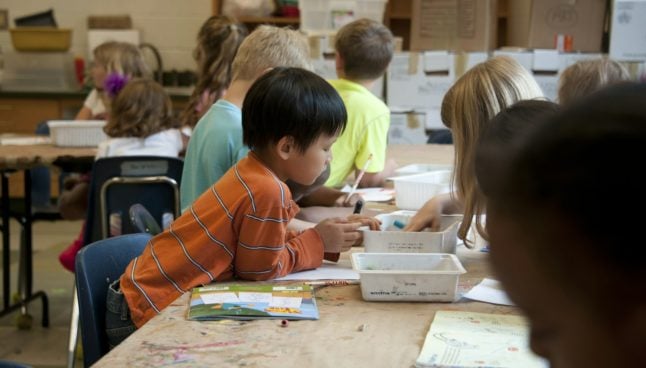International schools were originally founded for diplomats and foreign staff on the lookout for an English-speaking school to make the transition easier on their offspring.
Eventually, Switzerland’s international schools gained traction and began to attract the attention of many parents – even locals. Today they count among the most prestigious (and expensive) private schools worldwide.
First, let’s look at some of the advantages of an international school when compared to a state-run public school in Switzerland.
In general, Swiss-based international schools offer not only specially selected subjects, but also a better teacher-student ratio due to smaller classes, better equipment well as extracurricular activities ranging from tennis to drama lessons which not available in state-run local schools.
Moreover, private schools have so far been spared the teacher shortage which has taken over state-run schools. This in turn may lead to wealthier parents opting to choose a privately-run school to better secure their children’s future, according to the President of the Teachers’ Association Dagmar Rösler.
Still, there are a few things foreigners should consider before signing up their school-aged children to attend an international (or public) school.
Duration of your stay
If you are only moving to Switzerland for a short time and plan to relocate to your home country thereafter, an international school may prove just the right fit for your child as it could ease reintegration into their local school system.
Language and integration
Switzerland-based international schools are – for the most part – run in English with the odd exception offering a bilingual course in the local language paired with English. However, they will offer other languages in the curriculum.
If you plan to stay long-term or even settle down in Switzerland, it will be important for your child to integrate, and while this is possible when attending an international school, it will be much easier in a native environment – such as a state-run school – where your child is instructed in the local language.
This also enables your child to meet, interact and practice local languages with Swiss pupils as 95 percent of Swiss parents opt to send their children to state-run schools.
Additionally, most state-run schools offer additional language classes for foreign students.
Remember that while your child may feel more comfortable being in an international environment, this could make them feel isolated from Swiss culture in the long run.
You also should think about your child’s personality and what they might prefer or excel in.
READ MORE: 5 things you never knew about Switzerland’s school system

School set-up
The majority of international schools in Switzerland classify as so-called ‘day’ schools, meaning that students will stay at the school during their lunch break with lunch being included (and provided) within the school fees.
Local state-run schools, however, expect their students to head home during their lunch break and no meals are offered at those schools. This can prove complicate depending on the parent or caregiver’s work schedules.
It’s also a good idea to research how the schools are run. In Switzerland, cantons are responsible for public schooling and there can be differences depending on the region.
For instance, Studying in Switzerland reports that in German-speaking cantons, “kindergarten and two years of primary education are combined into the first learning cycle, and students aged four to eight years are in the same class. They call this Grundstufe or Basisstufe.”
In the French-speaking cantons, two years of kindergarten are combined with two other years to make the first cycle of primary education/
Meanwhile, in the Italian-speaking cantons “children attend kindergarten from the age of four”, says the site aimed at students and families considering Switzerland as a place to study.
At international schools, institutions often follow a particular country’s educational philosophy. For example, it may be based on American, British, French or Japanese school systems.
Distance
Switzerland’s public schools are usually in proximity to your home where your child should have easy access (by public transport) to the school. In fact, it is common for school-aged children to walk to school alongside their classmates rather than choosing to hop on a bus.
International schools will require you to arrange transportation – such as a school bus – and can be a hassle for your child to reach.
Cost
While it won’t be news to parents living in Switzerland who send their children to private schools, doing so is expensive – so expensive in fact that not only is Switzerland the most expensive country in Europe for international schools, but it is also home to the most expensive city for international schooling – Zurich.
Last year, a report, compiled by International Schools Database (ISD), compared the costs of international schools (in USD) in cities and countries across the globe.
Switzerland faced no real rivals in Europe for top spot, particularly considering that the three most expensive cities for international schools on the continent were all based in Switzerland.
Zurich took top spot with a median price of CHF 25,570, while Lausanne was in second (24,250 francs ) and Geneva was in third (23,366 francs).
Meanwhile, state-run schools in Switzerland are free of charge.
READ MORE:
- Why Switzerland is the most expensive country in Europe for international schools
- How much do international schools cost in Switzerland?
Admission
If you have chosen to send your child to an international school, you will need to apply in order for your child to be admitted.
This will largely depend on how many places are available at any given time. It is usually recommended to check the application criteria for your chosen school and apply early to get ahead of the competition.
State-run schools guarantee admission for children of mandatory school age.



 Please whitelist us to continue reading.
Please whitelist us to continue reading.
Member comments